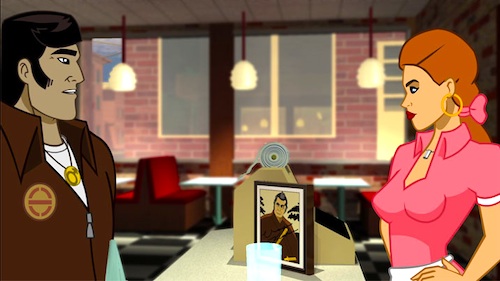By Joe Bendel. It is not exactly the missing forty minutes of The Magnificent Ambersons, but for Orson Welles fans it is still quite significant. Long considered lost to the ages, the silent short films Welles conceived for an ahead-of-its time stage production have been found (in Italy, as it happens) and restored by the film preservation department of the George Eastman House. Despite their strange genesis, the shorts known collectively as Too Much Johnson perfectly represent the Welles filmography—they are brash, innovative, and unfinished. Always fascinating and sometimes genuinely entertaining, Too Much Johnson, Welles’ first stab at filmmaking, had its long awaited New York premiere last night, courtesy of the Eastman House.
William Gillette’s summer stock staple Too Much Johnson is not revived very often anymore—and the Mercury Theatre’s disastrous production probably deserves its share of the blame. It literally bombed in New Haven. Welles’ original vision was rather ground-breaking. Each act would be preceded by a short silent film in the Max Sennett tradition that would dramatize all the play’s exposition and backstories. Of course, Welles never finished any of the shorts (and it is unclear whether the Stony Creek Theater could have accommodated them anyway), but since he had cut all the presumably redundant background information from the text, the production reportedly baffled critics and patrons alike.
To help contemporary viewers, the Eastman House’s preservation and curatorial staff provided running commentary throughout the New York screening, in addition to the requisite piano accompaniment. Eastman House made no editorial decisions, preserving every frame that came in the can. As a result, there are plenty of gaps, as well as repetitive takes of the same scene. Yet, the finished restoration is a smoother audience experience than it might sound like. Serendipitously, the multiple versions are often madcap hi-jinks that when viewed continuously appear as if the characters are caught in a surreal loop.

The first act prelude is the most complete and easiest to follow. Joseph Cotten plays a man named Billings, who has been romancing another man’s wife under the assumed name of Johnson. Coming home earlier than expected, the betrayed Dathis chases the man he thinks is Johnson across the future Meatpacking District, eventually ending on the ocean liner that will take both men’s families to Cuba for a dubious vacation. (Once there, Billings looks up an old friend, only to find his plantation is now owned by a man who really is named Johnson. Hilarity no doubt ensues.)
Frankly, Cotten’s prowess for Harold Lloyd comedy is quite impressive. He shimmies across ledges and drags ladders over rooftops like a rubber-boned pro. As if that were not enough, the first short also delivers Welles’ ever indulgent producer, John Houseman, as a bumbling beat cop.
The second and third constituent shorts are much more fragmentary, but there are some striking day-for-night shots of a Hudson Valley quarry, decked out with palm trees to resemble Cuba. Periodically, one gets a glimmer of Welles’ developing eye for composition. Cotten also maintains his energetic good sportsmanship as the caddish anti-hero.
Johnson might be a bunch of odds and ends compared to Welles later masterpieces, but it is strangely compelling to watch the bedlam he unleashes with his co-conspirators. The Eastman program also includes a three minute 16mm film documenting Welles directing Johnson that seems about as chaotic as you would imagine. Yet, there is also something very poignant about the happy-go-lucky but incomplete work, prefiguring Welles later abortive attempts to produce his Don Quixote.
Too Much Johnson is enormously important as cinematic history but also a good deal of fun. The Eastman House intends to hold future screenings with live commentary, so cineastes should definitely keep an eye on their website. They also hope to stage Welles’ adaptation of the stage play incorporating excerpts of the shorts, which is impressively ambitious.
Posted on November 29th, 2013 at 9:04pm.



